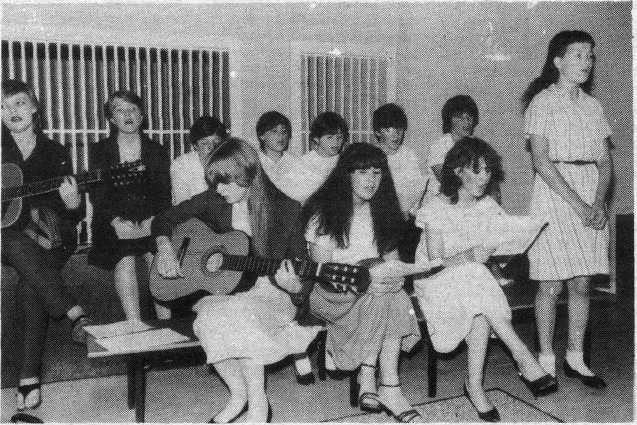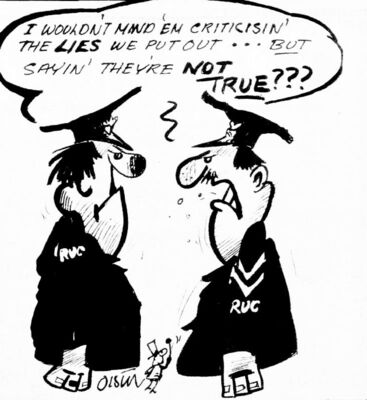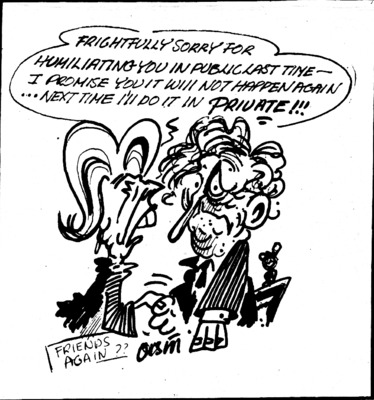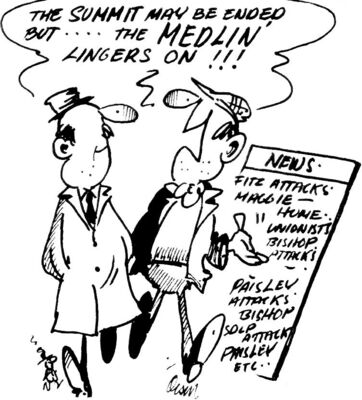We look back the stories that were making the headline this week back in 1983
Correction to 1981 Census figures
LAST week, an inside source in the Northern Ireland Office, confirmed that the dramatic corrections to the Census figures were made to suit the political convenience of James Prior.
The basic underestimation of Catholics was widely known within a number of Civil Service Departments including the Departments of Education, Health and Social Services and the Environment.
The knowledge was, however, concealed for political reasons since British policy was to minimise the effectiveness of the census boycott which look place during the hunger strike.
Within recent months, however, it became apparent that the extra seventy-four thousand people (4.74 per cent of the overall population) would be a useful factor in negotiations for funds from Westminster.
When this discovery was made, it was decided to "come clean" and admit the presence of this large unrecorded element of Catholics in the population.
Many politicians and political observers believe that the religious question won't appear in future census because it weakens Britain's case for supporting the Unionists whom they have always insisted are in a large majority in the Six Counties. And during the 1981 census many Unionist politicians, including D.U.P. deputy leader Peter Robinson, advised Protestants not to answer the religion questions. Politicians, both Irish and British, and churchmen, Catholic and Protestant, often quote the figure of "a million Protestants" in the Six Counties. If the evidence of impartial statisticians is to be believed, the total Protestant population is about eight hundred to eight hundred and fifty thousand (about 54 per cent) with all the trends pointing to a Catholic majority by the year 1991.
It is understood that the present British administration is anxious to sustain the "million Protestants" myth in the belief that it will help them to dampen down the growing political confidence of the Nationalist population.
‘Under siege by rats’
"WE are in a stage of siege, especially at night", say residents of Glasvey Drive in Twinbrook, who are worried that the growing rat problem will become a serious health hazard to families in the Glasvey area.
And the Housing Executive in Twinbrook has been accused of increasing the rat problem by their refusal to act without a public health writ.
The accusation comes after dissatisfied tenants along with the Twinbrook Tenant and Community Association and Sinn Féin met the Housing Executive area manager Mr Cochran on Friday last. They presented him with a letter and petition signed by Glasvey residents, demanding the re-landscaping of bushes and the culvert of the river in front of their homes which are breeding grounds for the rats.
A spokesperson for Twinbrook Tenant and Community Association has attacked the Housing Executive decision as 'scandalous' and added "that further steps will be taken to have the problem resolved."
Sinn Féin also condemned the Housing Executive's attitude and said it was determined by a desire to save money at the cost of local people's health.
Editorial: Standing by the Castle Street Black Taxi drivers
THE Black Taxis of West Belfast on both the Shankill and Falls Road, have become part of the community in a way that the buses could never hope to be. Operating in almost warlike conditions over the past 12 years they not only provided a fast, efficient and cheap form of transport in these working-class areas, but they have also on many occasions provided the very necessities of life needed to keep the community alive.
Often when public transport was not available and food deliveries sporadic, the black taxis were the only means people had for getting food, clothing and even fuel to their beleaguered homes.
While not wishing to demean the efforts of the Citybus men who have had to put up with an awful lot over the years, at the heels of the hunt, the actions of their employers are dictated by purely financial considerations and the welfare of the community comes second. This has not been the case with the ‘Black Hack’ drivers, who have often put life and limb as well as their vehicles at risk in providing a service for the community and despite the odd grumble from a few disgruntled passengers, the public appreciate this and have stood by them when they have had to take action to protect themselves and their colleagues from the harassment of the R.U.C. and British Army.
We are sure, therefore, that the people will stand by them in their present fight to remain in Castle Street, and operate as they have done over the past 12 years. To try and operate both buses and taxis from Castle Street is a ludicrous idea which could only come from a civil, servant with no idea of people's needs and an ordnance survey map for a brain. We also think that Mr Werner Heubeck of Citybus is being too cute by half when he says that someone else decides the transport policy, and he only complies with it.
It is hard to believe that any buses would go up Castle Street if he said it was unsuitable. Could it be that he sees this as a means to upset his only rival in the fight for passengers? Whatever the reason for this silly move, this newspaper will stand by the taxi men in whatever action they take to remain in Castle Street.








